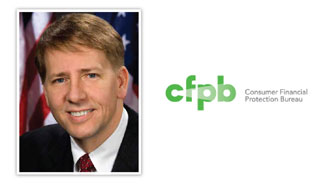CFPB Director Stresses Pledge to Reform Debt Collection

By subscribing, you agree to receive communications from Auto Remarketing and our partners in accordance with our Privacy Policy. We may share your information with select partners and sponsors who may contact you about their products and services. You may unsubscribe at any time.
WASHINGTON, D.C. –
Consumer Financial Protection Bureau director Richard Cordray recently reiterated a head-turning fact: currently 30 million Americans are subject to some form of third-party debt collectors.
And how these collectors, as well as repo agents and recovery departments, attempt to get some of that collateral and money back is about to be even more regulated. Cordray acknowledged exactly how that regulation is going to be carried out still is a work in progress, but emphasized the reasons for more government oversight.
“People have a lot of debt. And, let us face it: It is hard to collect debt in a tough economy,” Cordray conceded in remarks to the National Association of Attorneys General
“I want to emphasize that many debt collectors play by the rules, work diligently to do the right thing and comply with the law,” he continued. “But all too often they have insufficient or inaccurate information about the debts they are supposed to collect. Those who follow the law are placed at a competitive disadvantage in contrast to those who do not, and their reputations are harmed when they are lumped in with their competitors who engage in illegal activities.
Cordray remembered that when he was Ohio’s attorney general, his office faced “numerous headaches” over debt collection.
“Sometimes the problems were jurisdictional. Sometimes the players were tiny, fly-by-night operators. Sometimes, they were larger companies,” he recollected. “All too often, going after illegal debt collection activities felt like that old game at the carnival, ‘Whack a Mole.’ As soon as we got one, another popped up.”
Subscribe to Auto Remarketing to stay informed and stay ahead.
By subscribing, you agree to receive communications from Auto Remarketing and our partners in accordance with our Privacy Policy. We may share your information with select partners and sponsors who may contact you about their products and services. You may unsubscribe at any time.
Cordray pledged to the nation’s attorneys general that the environment is going to change with the CFPB leading the way. For starters, the CFPB recently issued a proposed rule to supervise all debt collectors in the United States with more than $10 million in annual receipts resulting from collection activities.
“If we can collaborate together towards a national strategic plan, we can address illegal debt collection more effectively,” Cordray predicted. “These practices affect all kinds of people — young and old, urban and rural, people of all races and religions — it can affect anyone who struggles with repaying a debt. The worst practices undermine our basic humanity, turning people into mere account ledger entries and spawning treatment that flatly disregards all common courtesy on the way to violating the law.”
And how are these operators breaking the law?
“Debt collection remains one of the top sources of consumer complaints on the state and federal level,” Cordray maintained. “While debtors need to pay back their creditors, the methods used by some debt collectors are just unconscionable. Harassment. Inexcusable language and threats. Repeated late-night phone calls. Collectors erroneously telling relatives they are responsible for the debt of the deceased. Calling military superiors about a servicemember’s debt and threatening their security clearance. Repeated efforts to collect debts from the wrong consumers. Some of this activity is downright illegal, and none of it comports with any proper vision of a civilized society.”
Cordray pointed out that to change the situation, the CFPB still cannot act alone. He reiterated the need for attorneys general to be an integral part of executing a plan at the state level.
“We intend to forge a strategic partnership with you and with our federal government colleagues in this arena — the Federal Trade Commission and the Department of Justice — to transform this situation in a more lasting way,” Cordray pledged. “Our goal is to help the honest debt collectors do their jobs responsibly and see that the rest are either rehabilitated or run out of business once and for all. Until we do so, we will be failing all those people who are counting on us to change the world for the better — including ourselves.”
Cordray’s entire speech can be found here.


